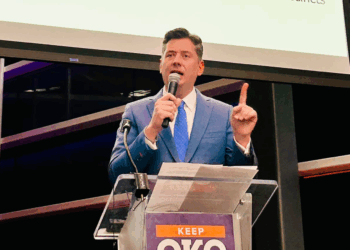OKLAHOMA CITY (OBV) – A bill that requires Oklahoma businesses to stay open during a pandemic unless scientific evidence shows that a business is contributing to the disease’s spread is progressing through the Oklahoma House of Representatives.
Senate Bill 672 states that a business cannot be closed unless documented scientific evidence shows that the nature of the business is contributing to spreading the pandemic.
Rep. Kevin West, R-Moore, is the House author of the bill.
“I believe this bill threads the needle between everybody’s rights,” West said. “The right to be safe, the right to have your business open, the right to make money. This goes right along with Article Two, Section Two of our Oklahoma Constitution, which states that all persons have the inherent right to life, liberty and the pursuit of happiness and the enjoyment of the gains of their own industry.”
The bill is so far succeeding in the legislature, having cleared the Senate and most recently passing the House Commerce and Economic Development Oversight Committee with a 14-3 vote.
SB 672 maintains the governor’s power to close businesses during a pandemic to protect public health, but requires scientific proof the business is a contributor to the spread of the disease.
The bill further requires that the governor to provide notice of the closure, giving the business in question the opportunity for a hearing on whether it’s detrimental to public health.
“This would give the business a course of action to plead their case and possibly stay open,” House officials said.
Contact tracing and other health care tools make it possible to accurately and definitively determine if a business is putting the public at risk, West contends.
West said there was inconsistent logic when it came to determining which businesses closed and which stayed open during the COVID-19 pandemic.
A study published within the National Library of Medicine shows that closure of anchor business during the pandemic was associated with 142 fewer positive COVID-19 tests per 100,000 population over a 40-day period. An anchor business is described in the study as manufacturing plants and distribution centers employing more than 1,000 workers.
“Even short-term and partial closures were associated with reduced spread,” the study’s results state.
SB 672 will next be considered by the entire House.
Sen. Julie McIntosh, R-Porter, is the Senate author of the bill.

















